16 Evidence-Based Health Benefits of Chia Seeds
If you are in your forties and you are reading this article, you may be familiar with the word “chia”.
This word was used in the Chia pets commercials launched in the late 70s.
Even though chia seeds might not be widely acclaimed, some celebrities such as Taylor Swift or Gwyneth Paltrow have publicly recognized chia seeds to be very helpful.
In pursuit of finding omnipotent nourishment, people have been looking for various nutrients.
It may be said that chia seeds are one of them due to large amounts of fiber and omega-3 fatty acids, plenty of high-quality protein, and several essential minerals and antioxidants.
It is no wonder that these seeds are popular because they may decrease the risk factors for heart disease and diabetes, increase blood levels and improve digestive health.
But we will talk about the nutrients and health benefits later in the article.
What is Chia Seeds?
Chia seeds are tiny, flat and oval-shaped seeds with a polished texture.
This plant (Salvia hispanica) has origins in Mexico and Guatemala, and comes from the mint family.
It is considered to have been a staple food for the ancient Aztecs and Mayans.
In fact, the word “chia” means “strength” in ancient Mayan (1).
Legend has it that ancient Aztec warriors had a ritual of eating a spoonful of chia seeds before a battle.
They consumed this plant because it kept them satiated over a period of 24 hours, causing them to be full of energy for the next day.
When it comes to color, it can vary from white to brown or black (2).
Due to their bland flavor, pretty much everything can be added to or mixed with chia seeds.
Some of the great ways to include these seeds into meals are adding to porridge, making into pudding, using in baked goods or smoothies.
They have an ability to absorb liquid, thus forming into a gel.
This enables them to thicken sauces or be a replacement to eggs in recipes (3, 4). Soaking seeds before eating is optional, but not necessary.
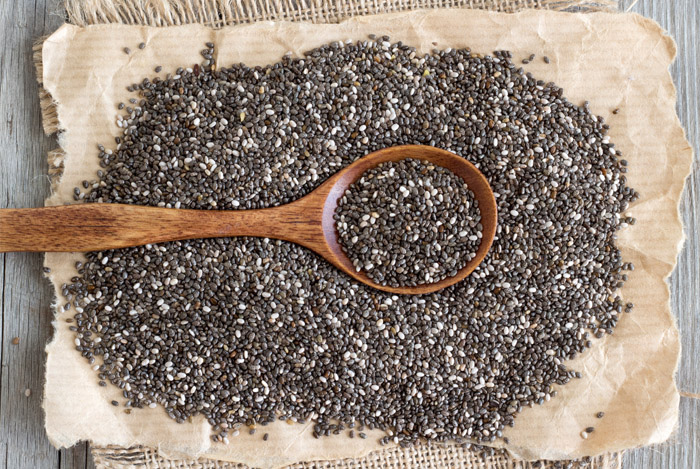
Nutrition Facts
Chia seeds contain 486 calories per grams, which 138 calories per ounce.
By weight, they contain 6% water, 46% carbohydrates (of which 83% is fiber), 34% fat and 19% protein.
Carbs and Fiber
The carbohydrate content found in chia seeds is in the form of fiber (more than 80%).
A portion of a single ounce (28 grams) of chia seeds contains 11 grams of fiber, which usually meets the recommended daily intake needs both for men and women (25 and 38 grams/day respectively) (6).
The fibers found in chia seeds are mostly insoluble (95%), and these fibers are linked with the reduced risk rates of diabetes (7, 8, 9, 10).
In the process of digestion the fibers, some of the insoluble fibers are likely to be fermented in the gut, causing them to become soluble fibers.
Soluble fibers have been associated with the formation of short-chain fatty acids and improvement of colon health (6, 11).
Chia seeds also react to water and other liquids in the sense that when they are put into some liquid, the fibers will absorb their own weight up to 10-12 times, changing the matter of the seeds from liquid to gel-like mass matter (7).
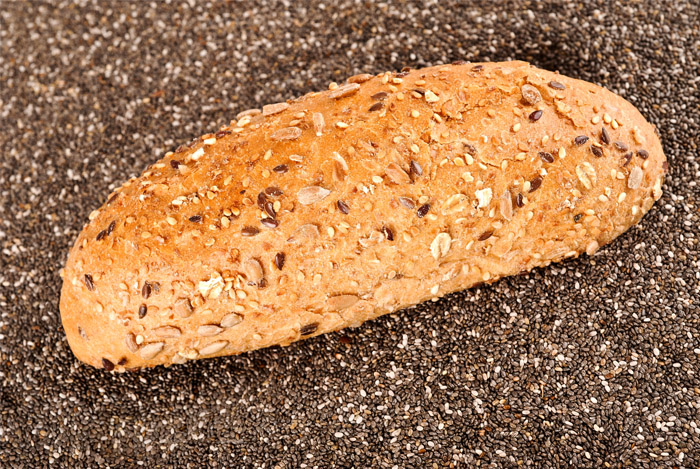
Fat
What makes chia seeds unique and special is the high content of omega-3 fatty acids, which are healthful for your heart.
Approximately 75% of the fats found in chia seeds include the omega-3 fatty acid alpha linolenic acid (ALA), whereas approximately 20% of them consist of omega-6 fatty acids (12, 13, 14).
There are a plenty of plants that are high in omega-3 fatty acids, but there is no plant as high in these acids as chia seeds.
Chia seeds are reported to be better than flaxseeds (15, 16).
One more thing that is important about the omega acids in the diet is the ratio between them.
The ratio between omega-6 and omega-3 acids is particularly important, and it is frequently observed at 15-17/1 because of omega-6 rich oils and the excess consumption of them (17).
Because of the fact that chia seeds are a great source of omega-3 fatty acids, they cause a more balanced ratio of omega-6 to omega-3.
A ratio of 2.5-4/1 has the ability to reduce the risk rates of chronic diseases, among which are heart diseases and inflammatory diseases, cancer and premature death (17, 18).
Even though chia seeds consist of a great amount of omega-3 fatty acids (ALA), these are not as potent as the ones that are found in fish or fish oil (EPA and DHA).
ALA is not an active form of the fatty nutrient.
Before they can be used by the body, they have to be converted into the active forms.
These active forms are EPA and DHA.
This is why this process is inefficient in many cases (19, 20, 21, 22, 23).
Protein
19% protein is found in chia seeds, which makes this ratio similar to other seeds.
However, chia seeds contain more proteins than most cereals and grains (13, 24, 25, 26).
A high protein intake has been linked with increased satiety and reduced food intake (27, 28).
Chia seeds are a good plant-based protein source because they contain high-quality protein with all the essential amino acids (29).
Though it is high-quality, the protein in chia seeds is not to be consumed as the sole protein source for children for it may cause harmful consequences (29).
What’s more, these seeds are also gluten-free, so those gluten-intolerant people can reap the benefits of chia seeds.
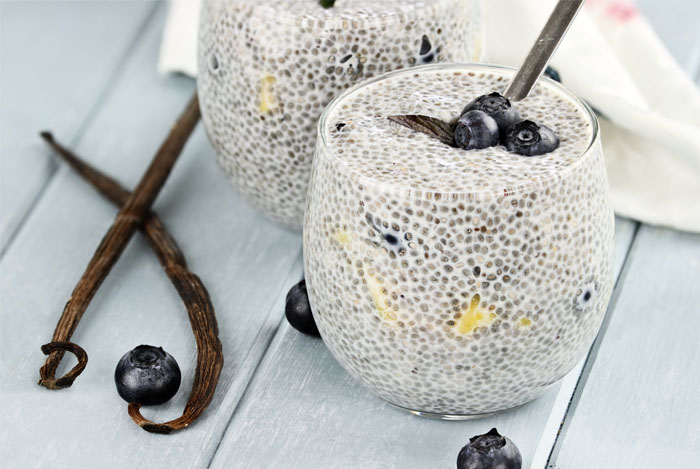
Vitamins and Minerals
Chia seeds are a great source of many minerals.
Yet, a number of vitamins in chia seeds is poor.
The list below contains the most abundant minerals in chia seeds.
Manganese: Whole grains and seeds, especially chia seeds are rich in manganese. This mineral is essential for metabolism boosting, development and growth (31).
Phosphorus: This mineral is often found in foods rich in protein. Phosphorus provides bone health and tissue maintenance (32).
Copper: A mineral that maintains heart health, prevents cardiovascular diseases, and is often lacking in the diet (33).
Selenium: It is known as one of the best antioxidants among minerals. It takes part in many processes in the body (34).
Iron: It is a component of hemoglobin in red blood cells. Also, it has a role of transporting oxygen throughout the body. Still, this mineral is likely to be absorbed just partially due to the phytic acid content of chia seeds.
Magnesium: It plays an important role in many processes in the body. Despite its health benefits, it is often lacking in the diet of the Western world (35).
Calcium: This mineral is the most abundant one in the human body, this making it essential for bones, muscles and nerves (36).
Some minerals such as zinc and iron may have a reduced absorption rate due to the phytic acid content of chia seeds.
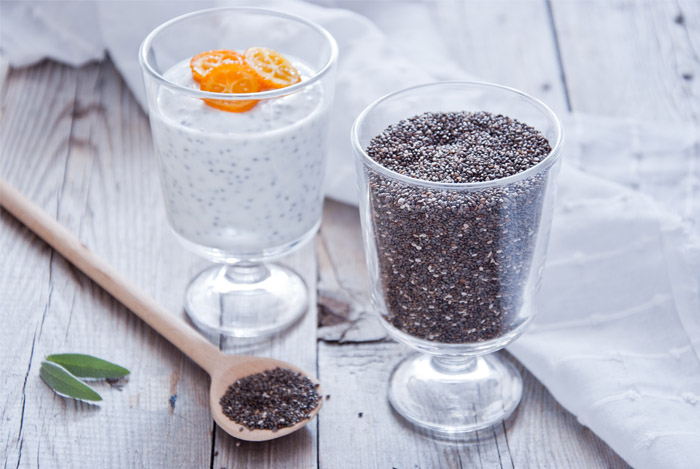
Other Plant Compounds
Chia seeds, besides other healthful compounds, contain other plant compounds that are in the least beneficial.
The list below consists of some of the main ones (12, 14, 37).
Chlorogenic acid: This antioxidant has been associated with lowering blood pressure (38, 39).
Caffeic acid: Many plant foods are rich in this substance. Caffeic acid is also a good means of fighting inflammation in the body (40).
Quercetin: This compound proved to be a powerful antioxidant, which reduces heart diseases risk, osteoporosis and some types of cancer (41, 42, 43).
Kaempferol: Another antioxidant found in chia seeds, which brings the benefits of the reduced risk of cancer and other chronic diseases (44, 45).
In order to have a very long shelf life, chia seeds have to be clean and dry because the antioxidants in chia seeds protect the fats from damage (46, 47).
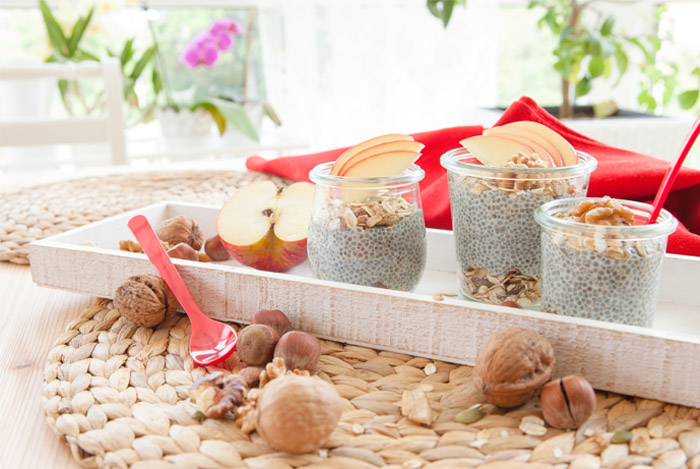
Health Benefits of Chia Seeds
Chia seeds have become of the most most popular foods in recent years.
Their high nutritional value, numerous health benefits both for the body and brain, and human studies all go in favor of this powerful plant.
Here is the list of the health benefits of chia seeds.
Stimulate Weight Loss
Like many other seeds, chia seeds are not the exception when it comes to weight loss.
This is because chia is high in fiber.
The fiber absorbs large amounts of water, causing the stomach to expand, which should ultimately make you feel full and slow the absorption of food (15).
A fiber found in chia seeds and called glucomannan has been studied on several occasions.
It has been reported to lead to weight loss (16, 17).
Then, knowing that the protein calls for reduced food intake, it may come as a logical conclusion that the protein in chia seeds reduces appetite, therefore, the amount of food we consume.
However, according to some studies, weight loss is not to be associated with chia seeds.
In support of these rather disappointing results, one study showed no significant effect on body weight is caused by regular consumption of chia seeds (18).
A study conducted on 90 overweight people, 50 grams of chia seeds per day for 12 showed that the effects on body weight or health markers were insignificant (19).
Even though chia seeds proved to be ineffective on body weight, they did increase the levels of Omega-3s in the blood, according to a 10-week study conducted on 62 women (20).
Although all these studies and their results claim that chia seeds have no substantial effect on your body weight, these seeds can be a very useful addition to your diet.
When chia seeds are soaked in liquid, they turn into a gel-like consistency.
This causes them to expand, where you end up feeling full in no time.
Also, you can’t shed a few pounds if sticking just one aspect of your diet.
Dieting includes many things such as lifestyle, sleep, exercise, and ultimately food.
A healthy lifestyle is a prerequisite.
If combined with chia seeds, rest assured weight loss will come as a natural outcome.
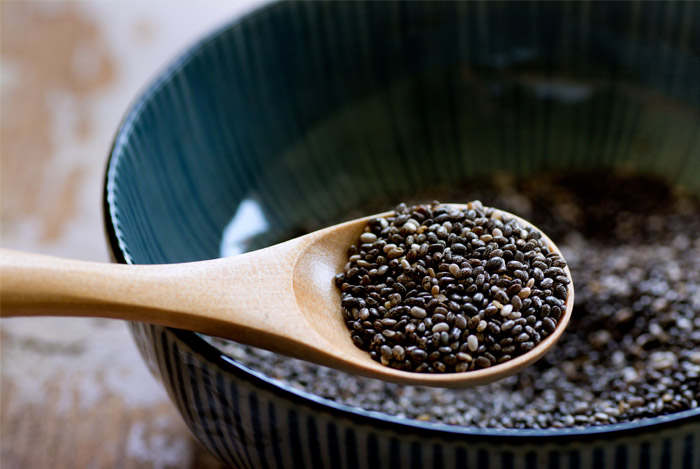
Packed With Fiber
Fiber is a substance which stimulates food digestion and colon cleansing.
If you take into consideration that an ounce of chia seeds contains approximately 12 grams of carbohydrates, 11 of which is fiber, this will certainly help your stomach to feel full, stop rumbling and crave for extra food.
However, these 11 grams of fiber are not digested by the body.
Carbs usually require some energy to be used.
Instead, fiber does not raise blood sugar, does not require the disposition of insulin, therefore, needs little or no energy.
The true carb content is equal to 1 gram per ounce.
This is a very low rate, making chia a low-carb friendly food.
Due to a big amount of fiber in them, chia seeds have an ability to absorb up to 10-12 their weight in water.
Once they have absorbed all the water, they gradually expand and become a gel-like substance (9).
As a result, you should feel fullness in your body, slowed absorption of the consumed food, and stimulation to eat fewer calories.
As you may already know, there are “friendly” bacteria in your body, especially the intestine.
These bacteria in your gut are important to take care due to the health benefits they bring (10).
Weight-wise, chia seeds are 40% fiber, which makes them one of the best fiber sources in the world.
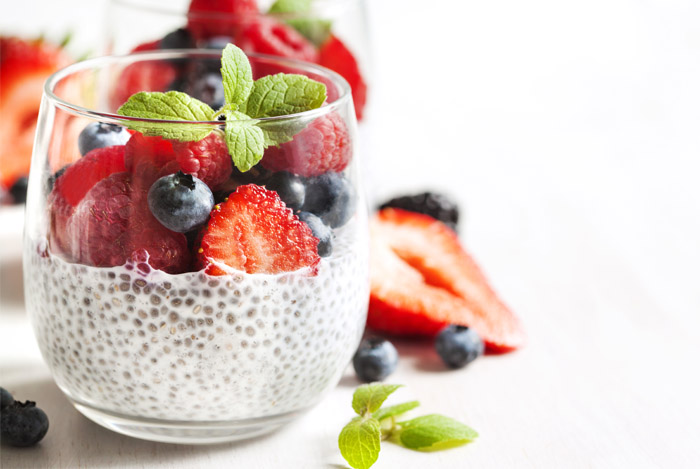
Regulate Blood Sugar Levels and Prevent Diabetes
Being high in fiber, protein and Omega-3s, chia seeds are in a position to improve metabolic health, therefore your blood sugar levels.
Without a proper diet and control, your body is susceptible to varying blood sugar levels that lead to cravings for sugar and other high-fat foods such as sweets or sodas.
In the case of unstable blood sugar levels, chia seeds are a recommended diet food.
According to a study conducted on 9 women and 11 men suffering from type 2 diabetes, the participants were either given 37 grams of chia, or 37 grams of wheat bran.
Throughout the period of 12 weeks, they were given these servings in addition to their normal treatment.
To sum up, stable blood sugar levels are paramount for optimal health.
Some studies in animals have proved that chia seeds are capable of reducing insulin resistance and controlling blood sugar levels.
Being exposed to unstable blood sugar levels disturbs the metabolic syndrome, leads to type 2 diabetes, and eventually heart disease (53, 54, 55, 56).
Many may be wondering what are the ways of incorporating chia seeds into your daily diet routine?
Well, making bread is one of the easiest ways to incorporate chia seeds into your diet on a daily basis.
What’s more, some human studies have come with the results that bread made with chia seeds reduces blood sugar compared to breads made in a more traditional way (57, 58).
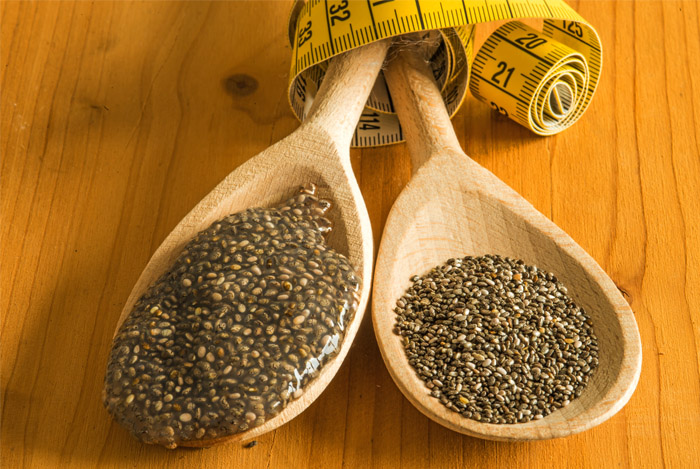
Fight Constipation
As already stated in the article, chia seeds contain a plenty of fiber.
The fiber found in chia seeds consists of insoluble and soluble fiber.
These two should be incorporated into your diet if you want to lose weight.
If you have a hard time losing weight, the answer might lie in constipation.
In order to lose weight, you have to keep your digestive system on track and break the cycle of chronic constipation.
These small wonder seeds might be of great help when it comes to accomplishing this task.
There has been a research done by Everyday Health, where it is explained how the fiber in chia seeds helps you drop weight.
According to the researchers, soluble fiber has an ability to preserve more water in your stool, causing waste to be larger, softer and easier to pass through your intestines.
On the other hand, insoluble fiber adds bulk to your fecal material, thus hastening its passage through the gut and preventing constipation.
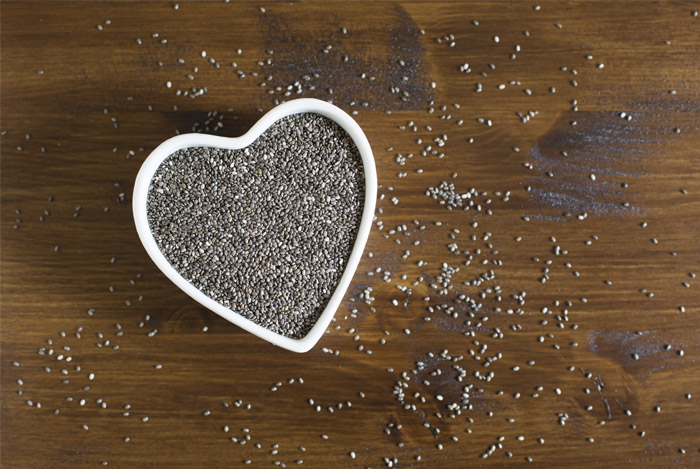
Dense Food Nutrition-Wise
Even though small in size, chia seeds are “big” in nutrients.
Do not be fooled. The size might deceive you because a mere spoonful of chia seeds, that is, 1-ounce portion will provide you with:
- 4.4 g of protein
- 42% of your daily recommended amount of fiber
- 30% of your daily recommended manganese
- 27% of your daily recommended phosphorus
- 18% of your daily recommended calcium
- 4915 mg of omega-3 fatty acids
- 1620 mg of omega-6 fatty acids
As you can see, though being small, these seeds contain so much nutritional power.
The list above, in fact, shows the nutrients found in just 137 calories.
Not many foods are this rich in nutrients.
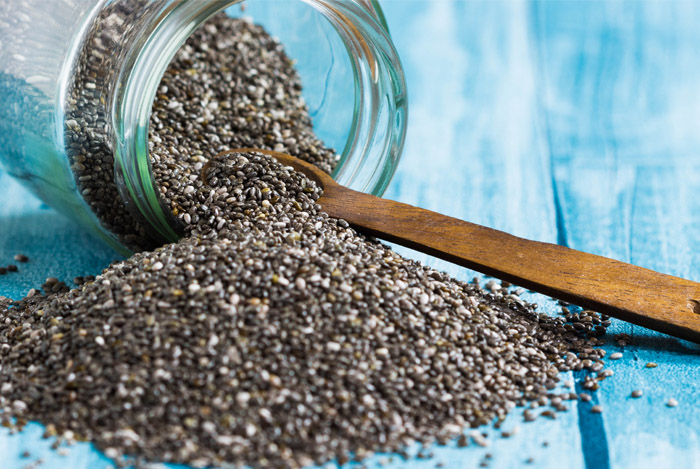
Maintain Cardiovascular Health
Even with the researchers conducted on the relevance between cardiovascular health and chia seeds, there are some established benefits that chia seeds bring to your heart.
First, it is a long-established fact that omega-3s found in chia seeds may reduce inflammation.
Furthermore, other researchers in this particular field of health suggest that omega-3s may also decrease the risk for thrombosis and arrhythmias.
As a result, the risk of heart attack, stroke or sudden cardiac death will drastically decrease.
Omega 3-s are also capable of decreasing LDL, total cholesterol and triglyceride levels, improve endothelial function, reduce atherosclerotic plaque, and lower blood pressure.
According to a review of 67 separate controlled trials, even a 10-gram per day can reduce LDL as well as total cholesterol.
Since fiber has proved to play an important role in maintaining the immune system and reducing inflammation, it goes without saying that inflammation-related conditions such as cardiovascular disease, obesity, cancer, and diabetes will not be likely to come about.
As for the richest sources of plant-based omega-3s, among them are chia seeds, hemp seeds, hempseed oil, flax seeds, flaxseed oil, and walnuts.

Boost Your Energy
According to legend, it was Mayans and Aztecs who first used chia seeds as an energy drink.
Ever since, chia seeds have proved to fuel performance back in the day.
This is so thanks to the mix of slow-digesting fiber and carbohydrate, which in turn provides you with long-lasting and pumping energy.
There are certain organizations such as Fleet Feet of St. Louis that encourage marathon runners to eat chia seeds in order to improve their performance because chia seeds fight dehydration, provide a considerable amount of energy, reduce joint inflammation, and accelerate post-run recovery.
In a study where 6 participants were loaded with carbs with either gatorade or a mix of half chia seeds and gatorade (28).
Two groups were competing. Then they ran for an hour on a treadmill, followed by a timed 10-kilometer long run.
No differences were seen between the groups, meaning that replacing gatorade with chia seeds did not reduce the participants’ performance, thus proving that chia seeds are useful in the case of endurance.
Chia seeds are responsible for the slower conversion of carbohydrates into sugar, which means that the carbs you consume will fuel your body for a longer period of time.
Also, you will have no need for sugar intake since you feel satiated because of the nutrients coming from chia seeds.
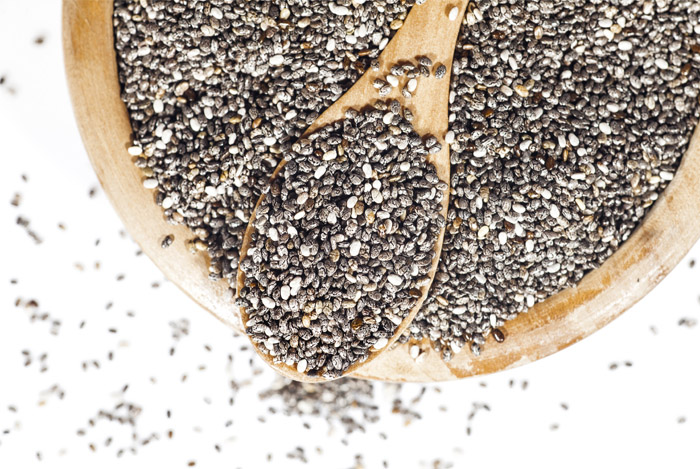
Pre- and Post-Workout Enhancement
You have probably been witnessed cases of the jitters that some commercial pre-workout drink options give you.
It is because these options are packed with caffeine and sugar, and more of these two means more water you need to drink in order to stay hydrated and maintain the balanced performance of your body.
Therefore, what you and your body need is a pre-workout drink that will provide you with sustained energy and hydration.
The simplest way of making homemade chia seeds drink is as follows: a splash of lemon and a spoonful of chia seeds.
You can both use this drink as pre and post-workout energy fuel.
On the other hand, there is another way of preparing your drink using coconut water.
Instead of using water, use a base of fresh coconut water and then add chia seeds to it.
The importance of using coconut water as an ingredient of this drink is the additional boost of hydration and electrolytes that are lost during exercise.
Coconut water also gives you energy before your workout, which enables you to stay fueled throughout the entire routine.
Concerning a post-workout refresher, use the same recipe and your muscles will recover faster, thus preventing you from feeling worn out and exhausted.
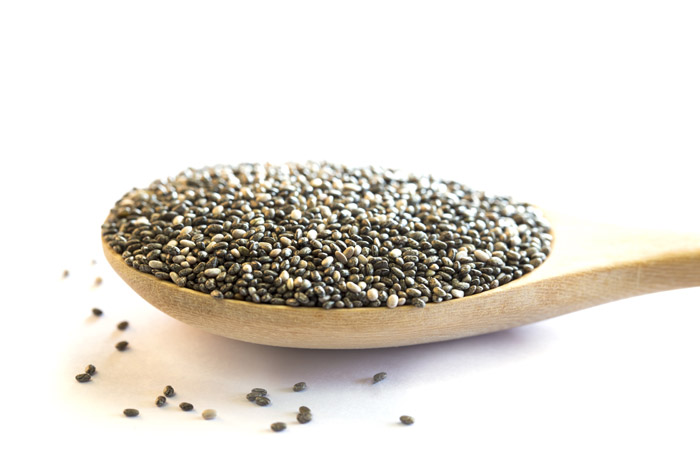
Packed With Protein
In addition to how great chia seeds can be for pre and post-workout is because they are rich in protein.
One serving chia seeds contains 137 calories and 4.4 grams of high-quality protein.
When compared to eggs that typically have 5.53 grams of protein and 80 calories per serving, chia seeds have the advantage.
By weight, chia seeds are 14% protein.
Protein-wise, chia seeds also have the advantage compared to most plants.
They also contain a decent amount of essential amino acids.
Thanks to these amino acids, our body is capable of absorbing the protein (11, 12).
Protein causes many health benefits for your health, and weight loss is one of them.
A high intake of protein reduces the appetite and draws attention from the compulsive thoughts about food by 60% and the desire to eat late at night by 50% (13, 14).
Chia seeds are an exceptional protein source, particularly for people who do not eat meat and animal products.
However, chia seeds should be considered as a supplement to a healthy diet, not a meal replacement.
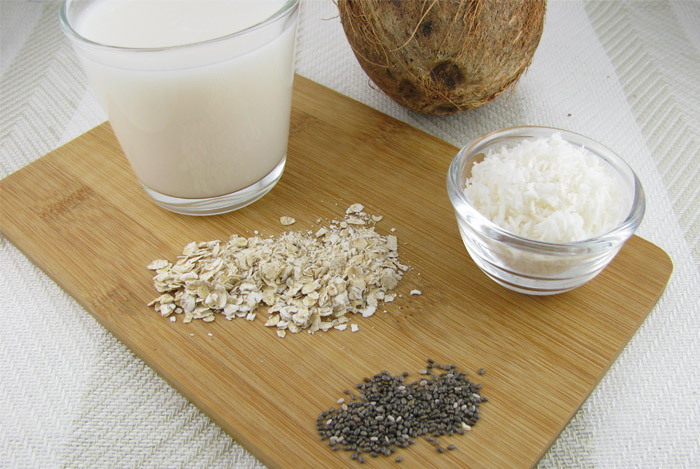
Great Mood Booster
If we account this potent plant to previously mentioned properties, its ability to lift moods comes naturally.
Chia seeds can actually make you feel happier because of the amino acid tryptophan found in them.
Also found in turkey meat, this powerful amino acid has the ability to help you with sleep-deprivation, thus making you sleep like a baby.
Besides that, there is a proof that it can boost not only your energy but your mood, as well.
According to SFGate, tryptophan is responsible for producing hormones and neurotransmitters like serotonin.
A more detailed elaboration is found in the article.
There it is claimed that serotonin plays an important role in fighting anxiety, thus encouraging mood boosting and producing the sleep hormone melotonin.
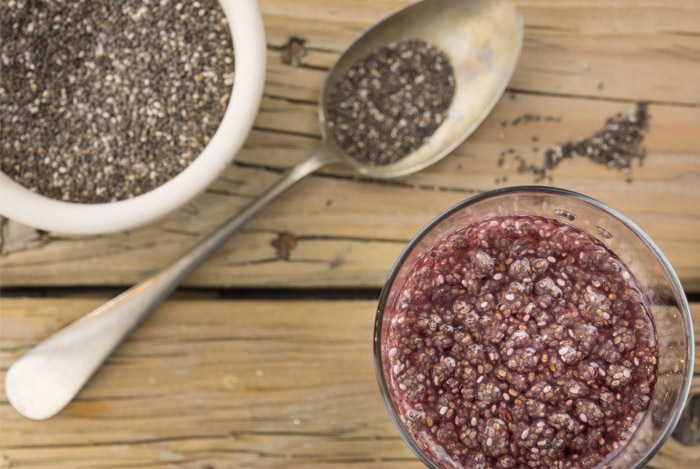
Rich In Antioxidants
Apart from many other potent nutrients, chia seeds also have a high amount of antioxidants in them (3, 4).
These antioxidants have the quality of protecting the sensitive seed fats from going rancid.
Even though many people turn to antioxidant supplements, which are chemical-based and not very effective, getting antioxidants from whole foods or foods in general, is likely to bring about many positive health benefits (6).
Free radicals, a natural by-product of the body, yet an enemy to its health, can be prevented from reproduction by these antioxidants.
Free radicals can damage molecules in cells and be conductive to aging and diseases like cancer (7, 8).
Some claims on the internet are of a piece that chia seeds have more antioxidants than blueberries.
Finally, the antioxidants in chia seeds are a great natural preservative, causing them to last up to two years.
To sum it up, the antioxidants can do make good for your health because they are an excellent provider of energy.
They also fight off free radicals and reduce the risk of cancer.
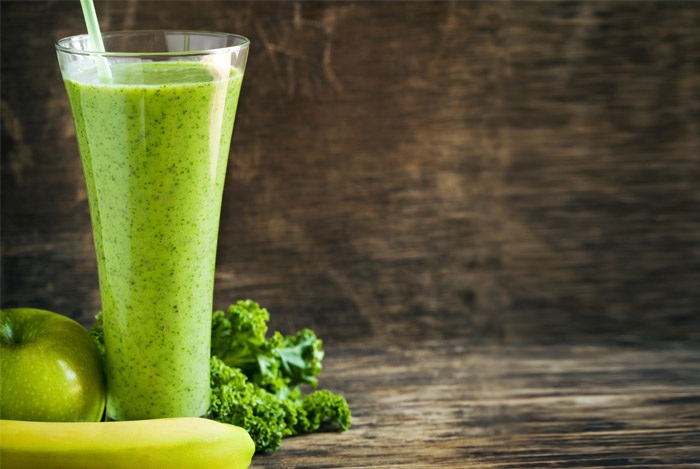
Well-Provided For Omega-3
One portion of chia seeds has 4900 mg of omega-3s.
Omega-3s are considered to be as healthy and beneficial as the antioxidants found in chia seeds.
Omega-3s have been associated with reducing inflammation and alleviating the pressure and pain in your joints.
For someone suffering from arthritis, chia seeds are the perfection supplement to a healthy diet.
On the other hand, there is some claiming that chia seeds contain more Omega-3s than salmon.
However, we should not forget that the Omega-3s found in chia seeds are mostly ALA (Alpha Linolenic Acid), which, contrary to popular belief, does not as many benefits as it is thought to.
In order to become beneficial, ALA needs to be converted into the so-called active form (EPA and DHA), before it can be absorbed by the body.
Unfortunately, humans do not have the ability to convert ALA.
So, Omega-3s from plants proved to be inferior compared to the ones coming from the animal sources like fish (21).
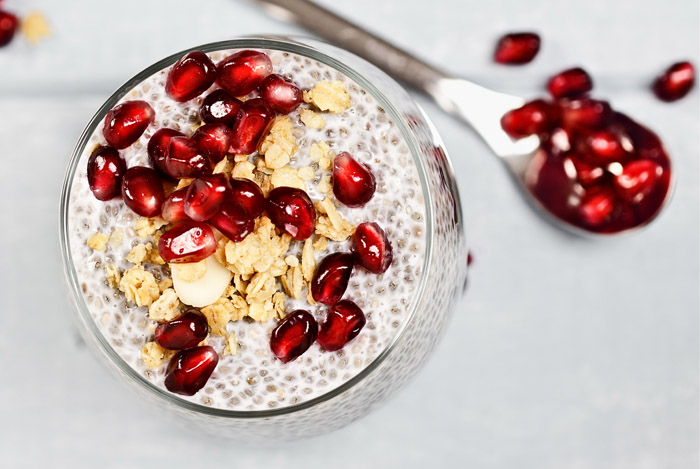
Good For Bones
1 oz serving of chia seeds will provide your body with 18% of the daily recommended dosage of calcium.
This ratio brings chia seeds to the top because it is more than most dairy products.
Therefore, for all those people that do not eat dairy products or are lactose-intolerant, chia seeds are an excellent source of calcium.
Apart from calcium, chia seeds are also high in other important nutrients when it comes to bone health such as phosphorus, magnesium and protein.
Chia seeds strengthen your bones as well as your teeth.
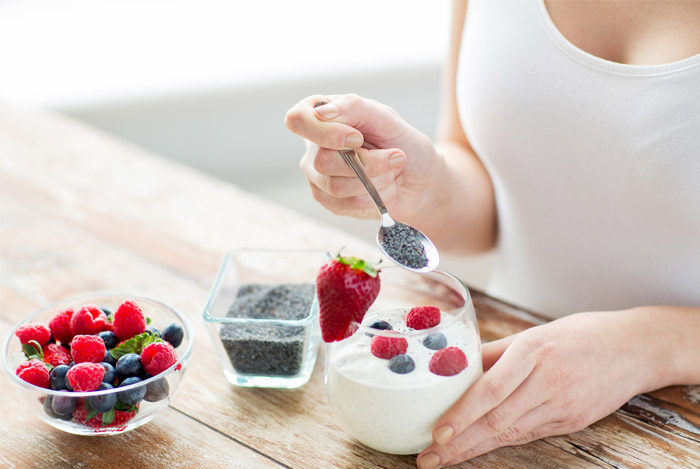
Help Your Teeth
Being packed with calcium, zinc, phosphorus, and Vitamin A, it comes as no surprise that chia seeds do wonders for your teeth.
Just like for bones, calcium is essential in building healthy and strong teeth.
As for zinc, it prevents tarter by preventing plaque to mineralize onto your teeth.
It also has an antibacterial effect and kills the germs that cause bad breath.
When it comes to Vitamin A and phosphorus and healthy teeth, they are as important as calcium and zinc.
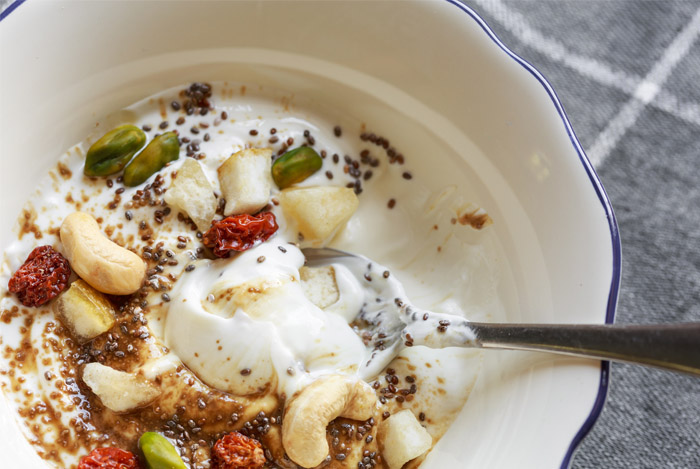
Grown Organically
Unlike many other “healthy” foods that are grown in the GMO environments, chia seeds are organic, raw, and non-GMO foods.
Mostly, their production does not require any additional artificial supplements and pesticides, making them one of the healthiest foods of our time.
So, what you do not have to worry about is consuming harmful substances that many foods are poisoned with in the today’s world.
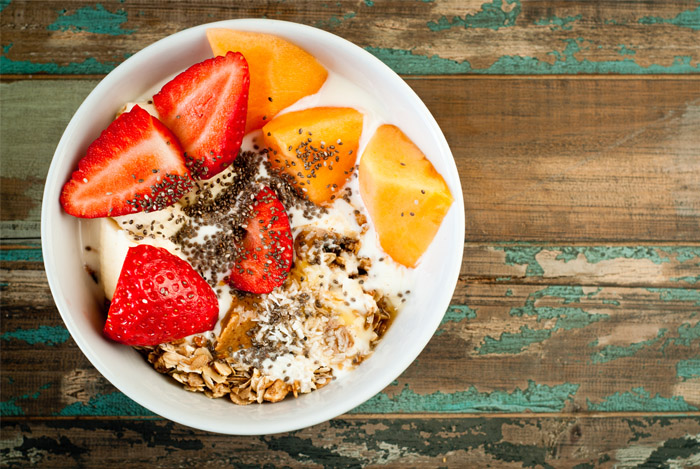
Easy to Incorporate Into Your Diet
Despite the fact that this is not a standard health benefit, it is rather important.
Due to their natural bland taste, you can add chia seeds to almost anything.
Just like flax seeds, the chia ones have to be ground.
This way they are much easier to prepare, and can be eaten raw, soaked in juices, or added to baked goods, puddings or porridges.
You can also use them to sprinkle your favorite smoothie, cereal, vegetables or rice dishes.
As we have already stated, when soaked in water, they tend to absorb both water and fat.
Because of their ability to thicken, you can add chia seeds to sauces or used them in some recipes as a substitute for eggs.
Chia seeds turn into a gel when mixed with water.
All in all, when mixed with anything, chia seeds boost the nutritional value of any recipe to a great extent.
Conclusion
Being loaded with fiber, minerals, antioxidants, omega-3 fatty acids, these nutrients make these seeds very potent and healthy.
Not only are they capable of preserving your health like digestion and gut, but they can also reduce the risk factors for heart disease and diabetes.
And what many people struggle with when buying these superfoods is incorporating into a healthy diet.
Well, you will not have to think about that either for they are easy to add to any recipe because of their adaptable substances.
FDA Compliance
The information on this website has not been evaluated by the Food & Drug Administration or any other medical body. We do not aim to diagnose, treat, cure or prevent any illness or disease. Information is shared for educational purposes only. You must consult your doctor before acting on any content on this website, especially if you are pregnant, nursing, taking medication, or have a medical condition.
HOW WOULD YOU RATE THIS ARTICLE?
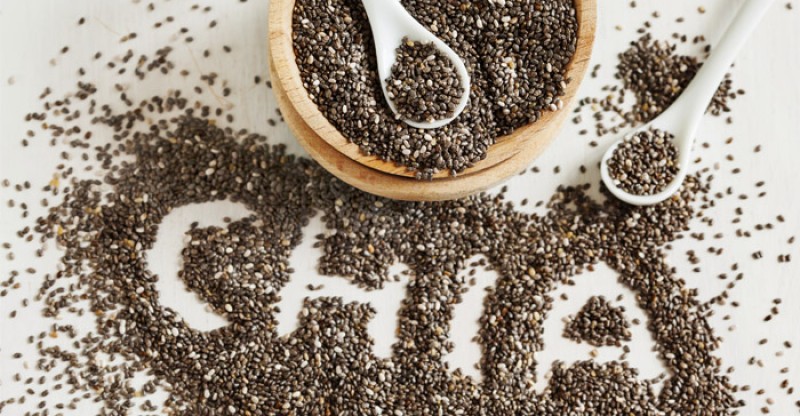


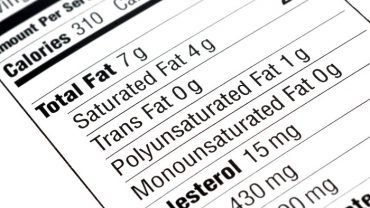
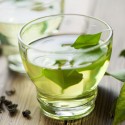

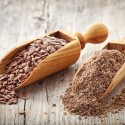
Im having chia almost everyday.
do you think its ok for me?
Is it possible to be allergic to chia?
I’ve recently included chia seeds in my diet and they are fantastic, especially in salads. This article made it more clear for me why they are so great. Thank you for the useful information!
Hello Sylvia, theoretically, you can become allergic to chia seeds, though it’s a quite rare allergy. I think while you don’t have rash, watery eyes or the other allergy symptoms, you can consume the seeds the way you’re used to:)
Thanks for this! Do you have any info showing the benefit of grinding the chia? I see some comments elsewhere that say no benefit in grinding.
Hello, Katie! You can grind the chia seeds without losing their benefits. Just make sure to grind dry seeds for a few seconds to prevent turning the seeds into butter.
What a great article on all the benefits of Chia Seeds, thanks so much! I have recently started having them each day and I feel fabulous. It always amazes me how such a small seed can be packed with so much goodness. I would recommend everyone to incorporate them into their diet.
Hello, Julie! Glad you liked the article! Chia seeds are truly amazing for health!
great article thankyou so much for providing so much information in one platform . recently i am searching my research topic on chia seed and this article clear my all problem and can you kindly send this article in pdf file
thanks once again
How can Chia seeds help patients of suffer from Gout, high blood Pressure and insufficient immunity?
Hi. What is the best time to take chia seeds and what should be the quantity…thanks
Grinding is not neccesary to absorb nutrients for chia seeds. When you place them in water they absorb water and the gel that forms is the fatty acid, making it accessible to be used by the body. This absorption makes it easier to break down the seed.